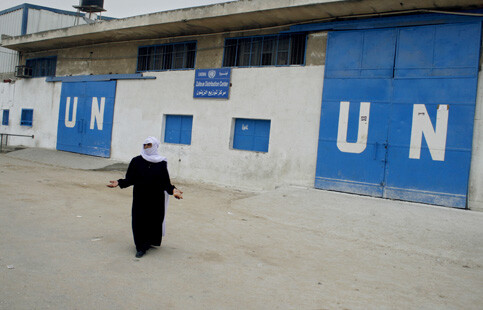The Electronic Intifada 29 December 2008

The UN agency for Palestine refugees (UNRWA) stopped delivering food aid to 750,000 refugees in Gaza on 18 December. (Hatem Omar/MaanImages)
GAZA CITY, occupied Gaza Strip (IRIN) - As a result of a major Israeli offensive on 27 December against the Gaza Strip a dire humanitarian situation looms, according to aid officials.
Gaza had been teetering on the edge of such a crisis even before the Israeli offensive: humanitarian access to Gaza has been severely restricted by Israel since early November.
Now infrastructure in several areas has been destroyed, leaving residents without electricity and water.
On 28 December Oxfam said it had been forced to temporarily suspend most of its humanitarian work in Gaza because of the bombing, and a program which will feed 25,000 people has also been put on hold.
Only United Nations agencies and the International Committee of the Red Cross (ICRC) have been able to send staff to Gaza since early November.
“Since 3 November Oxfam Great Britain’s requests for the coordination of 10 staff members to enter and exit Gaza have been denied,” said Oxfam administrator Mohammed Abu-Gharbieh.
The death toll in Gaza has risen to more than 300, most of them civilians and non-combatants. One Israeli civilian was killed on 27 December by a missile fired by militants from Gaza and a second civilian was killed on 29 December.
Home to 1.5 million Palestinians, Gaza is one of the most densely populated places on earth.
Shortage of medical supplies
“Our capabilities are limited. Since August we have not received basic medications. The ICRC, which usually delivers 60 types of medication, has been unable to deliver a shipment for one month” said health ministry spokesperson Hamam Nasman.
“One hundred and five drugs and 230 basic supplies, like alcohol, cotton, needles and IVs [intravenous drips] are out of stock.”
About 50 percent of Gaza’s 200 ambulances are not working due to the lack of spare parts, according to the head of ambulances and emergency care at the health ministry, Moawiya Abu Hassanein. As a result, victims were being brought to hospitals in private cars, donkey carts and some were being carried by others on foot.
Air strikes
“Eight students from Gaza Vocational Training Centre in Gaza City were killed and 20 injured … by an air strike,” Sami Mshasha, spokesperson for the UN Agency for Palestine Refugees (UNRWA). “Two UNRWA teachers were also killed.”
Numerous targets were attacked in the Israeli offensive which continued on 29 December, including the presidential compound, security and police headquarters, the central prison in Gaza City and five mosques.
“At least 55 women and children in Gaza have been killed in Israeli air strikes since Saturday [27 December],” according to a tally by a UN aid agency, said Mshasha.
The attack follows a decision by Israeli Prime Minister Ehud Olmert’s security cabinet to escalate Israel’s response to rockets fired by Palestinian militants in Gaza against southern Israeli communities.
The Israeli army said on 27 December that the air strikes “will continue, will be expanded, and will deepen if necessary.”
“UNRWA recognizes Israel’s legitimate security concerns. However, its actions should be in conformity with international humanitarian law and it should not use disproportionate force,” said Commissioner-General of UNRWA Karen AbuZayd.
Israeli goals
Israel has two goals, according to the spokesperson for the Israeli Prime Minister’s Office, Mark Regev: “To create a new security environment in Israel and to protect the population in the south.”
UNRWA spokesperson Christopher Gunness in Jerusalem said: “It is virtually impossible to run or to do large-scale planning for such a humanitarian operation. We feed more than 750,000 people in Gaza. The World Food Programme feeds over 200,000 people in Gaza. We do cash distributions to 94,000 people. To conduct an aid operation of this scale — given the drip drip drip on and off policy of supplies into Gaza — it’s become virtually impossible.”
UNRWA stopped distributing food in Gaza on 18 December.
This item comes to you via IRIN, a UN humanitarian news and information service, but may not necessarily reflect the views of the United Nations or its agencies. All IRIN material may be reposted or reprinted free-of-charge; refer to the copyright page for conditions of use. IRIN is a project of the UN Office for the Coordination of Humanitarian Affairs.
Related Links

